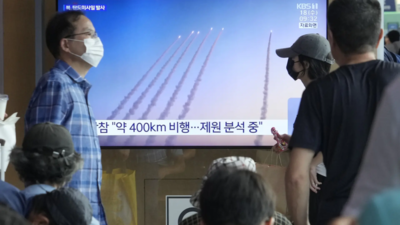- News
- World News
- Rest of World News
- North Korea test-fires missiles toward eastern seas amid nuclear expansion plans
Trending
North Korea test-fires missiles toward eastern seas amid nuclear expansion plans
North Korea's latest ballistic missile tests have escalated tensions with the US and neighbouring countries. The missiles were launched from an area north of Pyongyang, travelling approximately 400 kilometres. South Korea and Japan confirmed the launches, condemning them as a threat to regional stability. Kim Jong Un aims to rapidly expand North Korea's nuclear arsenal.

A TV screen shows a file image of North Korea's missiles launch during a news program at Seoul Railway Station in Seoul, South Korea, Wednesday (AP)
North Korea conducted multiple ballistic missile tests on Wednesday, according to South Korean and Japanese military reports, further escalating tensions with the United States and neighbouring countries. The launches occurred shortly after North Korea provided a rare glimpse into a secret uranium enrichment facility, as leader Kim Jong Un called for a swift expansion of his nuclear weapons program.
The South Korean joint chiefs of staff reported detecting North Korea launching multiple short-range ballistic missiles from an area north of Pyongyang, the capital. The missiles travelled approximately 400 kilometres (244 miles) in a northeasterly direction. The joint chiefs said that they were closely communicating with the United States and Japan while analysing the launches but did not immediately provide additional flight details.
Japan's defence ministry confirmed detecting at least two launches but did not specify the types of missiles or their flight distances. The Japanese coast guard advised vessels to be cautious of falling objects, as the missiles were believed to have landed in waters between the Korean Peninsula and Japan. NHK television reported that the missiles likely landed outside of Japan's exclusive economic zone.
The South Korean joint chiefs strongly denounced the launches as a provocation that "seriously threatens peace and stability on the Korean Peninsula." They emphasised that South Korean and US militaries were closely monitoring North Korean activities while maintaining a combined defence posture "to respond overwhelmingly to any provocation."
Analysts suggest that Kim's long-term objective is to compel the United States to recognise North Korea as a nuclear power and negotiate economic and security concessions from a position of strength. The disclosure of the uranium enrichment facility last week, accompanied by Kim's call for a rapid increase in nuclear weapons, underscores this goal.
As North Korea continues to expand and modernise its arsenal of nuclear missiles targeting the US and South Korea, the allies have intensified their combined military exercises and are updating their nuclear deterrence strategies based on US assets to counter the growing threat.
Analysts predict that North Korea may conduct a nuclear test explosion or long-range missile test before the US presidential election in November, aiming to influence the outcome and gain leverage in future negotiations with the new US administration.
The South Korean joint chiefs of staff reported detecting North Korea launching multiple short-range ballistic missiles from an area north of Pyongyang, the capital. The missiles travelled approximately 400 kilometres (244 miles) in a northeasterly direction. The joint chiefs said that they were closely communicating with the United States and Japan while analysing the launches but did not immediately provide additional flight details.
Japan's defence ministry confirmed detecting at least two launches but did not specify the types of missiles or their flight distances. The Japanese coast guard advised vessels to be cautious of falling objects, as the missiles were believed to have landed in waters between the Korean Peninsula and Japan. NHK television reported that the missiles likely landed outside of Japan's exclusive economic zone.
The South Korean joint chiefs strongly denounced the launches as a provocation that "seriously threatens peace and stability on the Korean Peninsula." They emphasised that South Korean and US militaries were closely monitoring North Korean activities while maintaining a combined defence posture "to respond overwhelmingly to any provocation."
North Korea has not immediately confirmed the launches, which follow a previous round of ballistic tests last week, during which Kim pledged to have his nuclear force fully prepared for confrontation with its rivals.
Analysts suggest that Kim's long-term objective is to compel the United States to recognise North Korea as a nuclear power and negotiate economic and security concessions from a position of strength. The disclosure of the uranium enrichment facility last week, accompanied by Kim's call for a rapid increase in nuclear weapons, underscores this goal.
As North Korea continues to expand and modernise its arsenal of nuclear missiles targeting the US and South Korea, the allies have intensified their combined military exercises and are updating their nuclear deterrence strategies based on US assets to counter the growing threat.
Analysts predict that North Korea may conduct a nuclear test explosion or long-range missile test before the US presidential election in November, aiming to influence the outcome and gain leverage in future negotiations with the new US administration.
End of Article
FOLLOW US ON SOCIAL MEDIA











